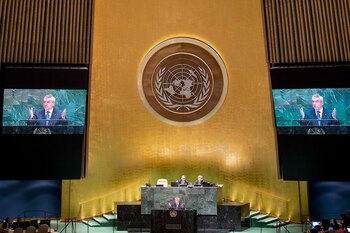
Once again, sport as an adjustment variable for problems that politics does not know, does not want or cannot solve. Diplomacy, on the other hand.
Legends as endearing as they are unverifiable assert that, when the time came to honor the idols of the Stadium, even the fiercest war mutated in time of peace.
Issues from romantic times that no one should seriously attempt to replicate in times of wars with drones and social media.
The call for an Olympic truce is usually a mere formality at the UN General Assembly, which traditionally calls for the cessation of armed clashes during the two-week duration of the Games. However, this time it coincides with two wars of significant global impact, such as those in Ukraine and the Gaza Strip.
The resolution urges member states to sign the Olympic truce “individually and collectively” from seven days before the start of the Olympic Games in Paris to seven days after the end of next year’s Paralympic Games. The text, prepared by France and co-sponsored by more than sixty countries, also underlines the “importance of cooperation between member States to apply the values of the Olympic truce in the world”.
The conflict in Gaza, despite being a central concern for several UN agencies, was barely mentioned during the General Assembly debate on Tuesday. However, the conflict in Ukraine was at the center of the discussion from the moment the Russian representative to the UN, Maria Zabolotskaya, took the floor: “Our country has always supported the Olympic truce, but this year it will abstain in protest against the illegal exclusion of Russian athletes from international competitions,” he said.
Faced with this statement, Russia only received explicit support from Syria at the time of the vote, while other allied countries, such as China, simply called for the depoliticization of the Olympic Games and of sports in general.
The president of the IOC, Thomas Bach, addressed the General Assembly to respond to the Russian representative and said: “In this fragile world, this resolution of the Olympic Truce is more relevant than ever. Yes, of course we can unite, even in times of war and crisis.” Bach also took advantage of the exhibition to warn against Russia’s plan to organize the World Friendship Games in Moscow and Yekaterinburg from September 15 to 29, 2024, as an alternative to the Paris Olympic Games: “It would lead to the political fragmentation of international sport,” he emphasized. His 13-minute speech ended with a request to “give peace a chance”, invoking John Lennon’s lyrics that Bach had also quoted at the opening ceremony in Beijing 2022, 20 days before Russia invaded Ukraine.
Another speaker on Tuesday was Tony Estanguet, the former paddler who chairs the Paris 2024 Organizing Committee. “The Games are the best embodiment of the power of sport because they combine the values of sport and the diversity of the world; they are universal,” he told the UN, adding: “In the current context of conflicts and tensions in which we live, we are more convinced than ever that we need the Games.”
Últimas Noticias
Sinner-Alcaraz, the duel that came to succeed the three phenomenons
Table tennis: Brazil’s Bruna Costa Alexandre will be Olympic and Paralympic in Paris 2024

Rugby 7s: the best player of 2023 would only play the medal match in Paris

Rhonex Kipruto, owner of the world record for the 10000 meters on the road, was suspended for six years

Katie Ledecky spoke about doping Chinese swimmers: “It’s difficult to go to Paris knowing that we’re going to compete with some of these athletes”





